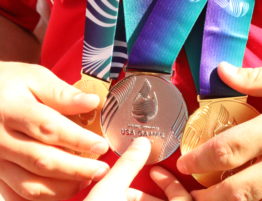
Sportsmanship: How You Play the Game
When it comes to any competition, whether it be driveway basketball, a friendly game of Monopoly or a swim meet, one element is key to ensuring a high caliber of fun: good sportsmanship.
“You don’t win silver. You lose gold.” That was the resentful message of a athletic shoe commercial that aired on TV during the 1996 Summer Olympics. Such messages combined with a “winning is everything” attitude embraced by increasing number of coaches, spectators, and parents makes it difficult to teach our athletes that it’s not whether you win or lose, but how you play the game that’s important. Good sportsmanship is critical because it keeps athletes safe, teaches valuable life lessons and makes playing more fun for all involved.
It’s not surprising that the rise in bad sportsmanship and outrageous behavior in professional sports has resulted in an increase of poor sportsmanship (trash-talking, cheating, arguing referee’s calls) in youth sports. Regardless of whether we caution our athletes to NOT idolize professional athletes who behave badly, they will continue to be influenced by the behavior of the professional athlete.
Both parents and coaches can start instilling the importance of good sportsmanship and offset the “win at all cost” philosophy by focusing on these issues:
- Be your athlete’s role model. Offer praise and encouragement for all athletes, including the opponents. Never openly berate, tease, or demean any athlete, coach or referee while attending a sporting event.
- Do you have a hidden agenda? Be honest with yourself about why you want your athlete to play organized sports. What do you want her/him to gain from the experience? Are your intentions based on providing her/him with pleasurable, social activities that develop a better sense of self-worth, skills and sportsmanship? Participation in sports and the importance attached to it should not be driven by a parent’s desire to use her/his athlete’s sports accomplishments for ulterior purposes.
- You set the rules. It’s ultimately your responsibility to teach your athlete good sportsmanship, both as a participant and spectator. If you observe your athlete engaged in poor sportsmanship, regardless of whether his/her coach corrects him/her or not, you must discuss your athlete’s misbehavior and insensitivity with him/her after the game. If a coach is ignoring, allowing, or encouraging poor sportsmanship, you need to make your objections known to the coach in a private discussion.
- Watching and learning. Whether you’re watching sports on TV or attending a sporting event, you can always find “teachable moments” regarding sportsmanship. Ask you athlete his/her opinions of: players who showboat and taunt their opponents; the costs to the team of a technical foul, or being ejected from the game for unsportsmanlike conduct; and the appropriate behavior or opposing players toward one another after the game. During these “teachable moments” ask him/her open-ended questions and listen more than you talk or lecture.
Tips for Coaches
Coaches nurture good sportsmanship. They should embody parents’ values regarding good sportsmanship. A coach must model good sportsmanship at every level and make it a core goal of his work with athletes.
Coaches should engage his/her players in a detailed discussion of good sportsmanship as soon as the team forms. A written contract, perhaps titled The Good Sportsmanship Code, should be given to every athetle and his/her parent to sign. The contract should spell out what the coach expects from each player in terms of good sportsmanship, including the following areas:
- Cheating
- Losing one’s temper
- Negative criticism of teammates, coaches, referees, and opposing players
- Blaming teammates for mistakes or a poor team performance
- “Trash talk” and taunting opponents
- Showboating
- Arguing referees’ calls and judgments
- The need to congratulate one’s opponents after a game
Coaching is an honor and a privilege that carries with it a moral responsibility to contribute to the healthy character development of players. Coaches who equate “trying your best” as the definition of success and who value, expect, and demand good sportsmanship from their players help shape the moral, ethical, and spiritual character of players.
In the end, the most important thing you can do is support your athlete’s decisions and encourage them to focus not on winning, but on fully participating every time they step onto the playing field. Do this, and you will be well on your way to growing a good sport.








